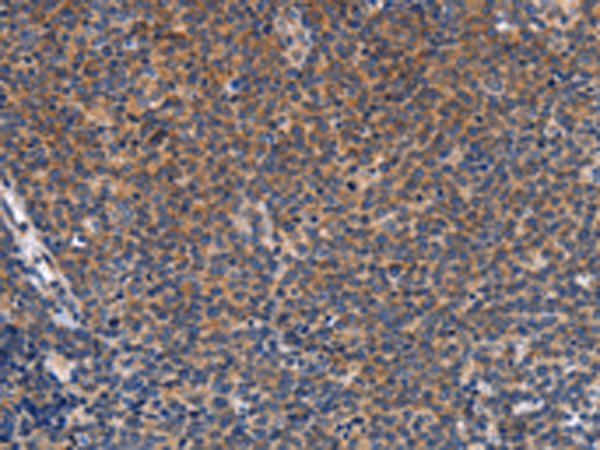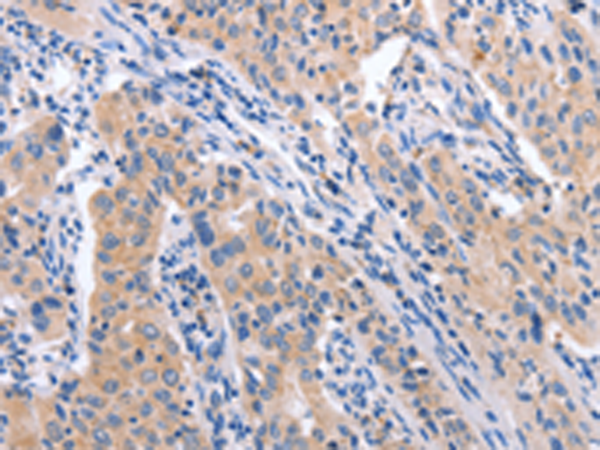

| WB | 咨询技术 | Human,Mouse,Rat |
| IF | 咨询技术 | Human,Mouse,Rat |
| IHC | 1/50-1/200 | Human,Mouse,Rat |
| ICC | 技术咨询 | Human,Mouse,Rat |
| FCM | 咨询技术 | Human,Mouse,Rat |
| Elisa | 1/1000-1/5000 | Human,Mouse,Rat |
| Aliases | CKb8; MIP3; Ckb-8; MIP-3; MPIF-1; SCYA23; Ckb-8-1; hmrp-2a; CK-BETA-8 |
| Host/Isotype | Rabbit IgG |
| Antibody Type | Primary antibody |
| Storage | Store at 4°C short term. Aliquot and store at -20°C long term. Avoid freeze/thaw cycles. |
| Species Reactivity | Human |
| Immunogen | Synthetic peptide of human CCL23 |
| Formulation | Purified antibody in PBS with 0.05% sodium azide and 50% glycerol. |
+ +
以下是关于CCL23抗体的模拟参考文献示例(仅供学术参考,非真实文献):
---
1. **标题**:*CCL23 Chemokine as a Biomarker in Colorectal Cancer Progression*
**作者**:Smith A, et al.
**摘要**:本研究通过抗CCL23抗体检测发现,CCL23在结直肠癌组织中的高表达与肿瘤侵袭性和患者预后不良显著相关,提示其可能作为潜在治疗靶点或诊断标志物。
2. **标题**:*Neutralizing CCL23 Antibody Attenuates Inflammatory Arthritis in Murine Models*
**作者**:Zhang L, et al.
**摘要**:利用抗CCL23中和性抗体干预小鼠类风湿性关节炎模型,结果显示炎症细胞浸润和关节破坏显著减少,表明CCL23在自身免疫性炎症中的关键作用及治疗潜力。
3. **标题**:*CCL23 Antibody-Based Detection of Tumor-Associated Macrophage Polarization*
**作者**:Yamamoto K, et al.
**摘要**:开发了一种高特异性抗CCL23单克隆抗体,用于分析肿瘤微环境中巨噬细胞的极化状态,发现CCL23表达与促瘤M2型巨噬细胞富集密切相关。
4. **标题**:*Therapeutic Targeting of CCL23 in Chronic Obstructive Pulmonary Disease*
**作者**:Brown R, et al.
**摘要**:通过抗CCL23抗体阻断其与受体CCR1的相互作用,显著减轻慢性阻塞性肺病(COPD)模型中的气道炎症和纤维化,为临床干预提供了实验依据。
---
如需真实文献,建议通过PubMed或Web of Science以“CCL23 antibody”为关键词检索近年研究。
CCL23 (Chemokine (C-C motif) ligand 23) is a small cytokine belonging to the CC chemokine family, primarily involved in immune cell recruitment and inflammation regulation. It binds to chemokine receptors CCR1 and CCR2. mediating chemotaxis of monocytes, T lymphocytes, and dendritic cells. CCL23 exists in two splice variants, CCL23α and CCL23β, differing in their N-terminal regions. It plays roles in both innate and adaptive immunity, with implications in chronic inflammatory diseases, autoimmune disorders (e.g., rheumatoid arthritis), and cancer progression.
CCL23 antibodies are essential tools for studying its expression, function, and signaling pathways. They enable detection in biological samples (e.g., ELISA, Western blot, immunohistochemistry) and can neutralize CCL23 activity in experimental models. Research using these antibodies has revealed CCL23's dual role: promoting anti-tumor responses in some contexts while facilitating tumor angiogenesis and metastasis in others. Therapeutic applications are being explored, particularly in blocking CCL23-mediated inflammatory pathways or disrupting its tumor-supportive effects. Commercial CCL23 antibodies are typically monoclonal or polyclonal, validated for specificity against human or murine isoforms. Recent studies also investigate CCL23 as a potential biomarker for disease severity in conditions like atherosclerosis and psoriasis.
×